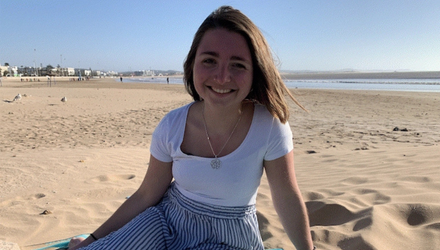Name: Zoë Graef
Age: 21
Where do you call home? Würzburg, Germany
Education degree: High School degree
Who do you live with? I live in my own apartment next to my parents’ house.
What’s a typical day for you? First, I get up and ready for university. Then go there by bus or with my car. Sometimes, I hang out with my friends afterwards. Often I have some sort of doctor’s appointment and physical therapy. Most of the time, I go home and do stuff with my family and my boyfriend or for university. In the evenings I love watching series or reading and then I go to bed, apparently too late.
How long have you known you are living with FA? I was diagnosed at the age of 14. I have known for 7 years that I have FA.
Are there any others with FA in your family? Yes, my little sister, who just turned 12, has FA, too.
Description from walking to using a walker/being in a wheelchair: After high school, I felt very unstable when walking alone. Also, I fell sometimes, so I decided to use a walker. One year afterward I started using a wheelchair for longer walks and traveling because my legs hurt after a few hundred meters of walking, and I felt tired.
What do you like to do to stay active and what type of exercises work for you to stay strong? I go to physical therapy one to two times a week and am doing fitness and cardio exercises every day.
Do you have any hobbies or special interests? I love watching series, reading books (in the moment about feminism), spending time with friends and family, listening to Podcasts, baking, eating good food, playing games and most of all traveling the world.
What is a good trick to make daily life easier? Good food and opening up about my thoughts with my boyfriend and friends. Also, accepting help and using different kinds of (walking) aids make my life easier.
When FA gets you down, what do you do to feel better? Sometimes talking to people that are close to me helps. Sometimes it helps me when I watch series, eat chocolate, and/or cry. Sometimes listening to podcasts or music and doing sports makes me feel better. Appreciation of the things and people I have in my life. Places I’ve seen and experiences I’ve made so far help me to regain positivity and strength.
What is one way living with FA has POSITIVELY affected your life? It made me be open and tolerant and appreciate the small things in life. Because of FA, I developed the idea to help other people with diseases, which is why I’m studying social work.
What is a favorite motivational quote of yours? “I have FA, but FA doesn’t have me.”
What is a piece of advice that someone with FA has given you that encourages and inspires you? “Do what makes you happy and don’t let anyone tell you that you can’t!”
What is the best advice YOU could give to a person who has been newly diagnosed with FA? So first of all, life’s not over because of FA. It may bring you down, but also a lot of funny moments and ups if you treat it with humor. Secondly, don’t take it too personally and seriously if people stare at you. Treat yourself with kindness, eat healthy, try to stay active and surround yourself with people that make you happy.
What is the first thing you want to do when a cure/treatment for FA is found? I’d travel to New Zealand and wander.
“I have FA, but FA doesn’t have me.” What does this statement mean to you? How do you live your life in the face of adversity? That statement’s like my life’s mantra.
Tell us a little more about you: Despite having FA, I’m a normal young woman. I do most of the stuff girls my age do, just a little bit differently. I hate other people limiting me, and I’m starting to blog about limitations as a disabled young woman. I want to encourage others in a similar situation to live without boundaries.
Interview by
Jakob Mitterhauser
